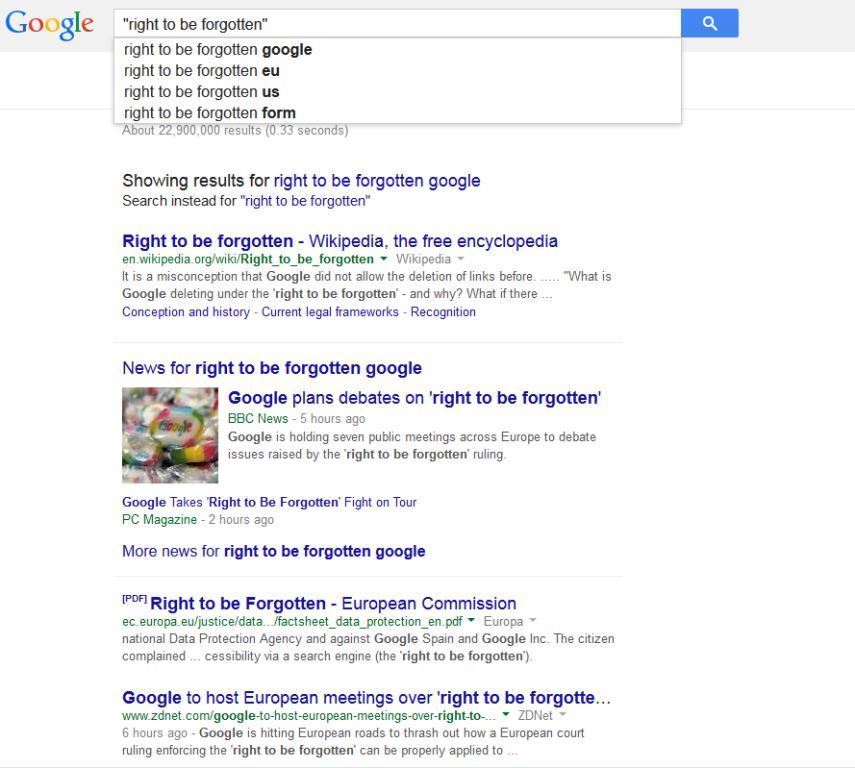Starting Tuesday, Google (Nasdaq: GOOG, GOOGL) will host the first of seven meetings to debate a controversial Internet privacy law imposed by the European Union.
The move is the company's latest stroke of genius, but this time, Google's not crafting a futuristic new product. It's finding a way to deliver the perfect balance between privacy and freedom of information to users.
 Click to Enlarge |
In early May, an EU court said that individual European citizens have the right to demand that Google remove their personal data from Internet search results. The ruling has come to be known as the "right to be forgotten" law.
In response, GOOG launched a service in late May that allows citizens to apply for data removal, but it's proven an extremely burdensome task for the company.
You see, Google currently processes more than 90% of all web searches in Europe. The day it launched the service, the company received more than 12,000 data removal requests - or 20 requests per minute. By July, Google had received a staggering 90,000 requests.
The company must evaluate each request to determine whether the information in question is "irrelevant, outdated, or otherwise inappropriate." It must verify the authenticity of the person making the request via photo or other ID. And, most problematically, Google must weigh the removal against the public's right to know the information.
So far, Google has granted more than half the applicant requests.
But the system leaves GOOG in the awkward - and powerful - position of Internet censorship. It's a controversial responsibility that neither Google nor the backers of the "right to be forgotten" law want the company to take part in.
And that's precisely why the company is holding meetings across Europe starting this week...
GOOG Will Strike a Balance by Crowdsourcing
The first of seven meetings takes place Tuesday in Madrid, and GOOG has said those interested in attending may sign up online approximately two weeks prior to each event. The panel will convene in Rome on Sept. 10, in Paris on Sept. 25, in Warsaw on Sept. 30, in Berlin on Oct. 14, in London on Oct. 16, and in Brussels on Nov. 4. Google will also live-stream the sessions online.
Attendees are set to discuss how Google should strike the appropriate balance when scrubbing information from its search engine between online freedom of speech versus an individual's right to privacy.
"This obligation is a new and difficult challenge for us, and we're seeking advice on the principles Google ought to apply when making decisions on individual cases," Google said of the meetings. "That's why we're convening a council of experts. We're just getting started, but during this process we also want to hear your input, too - this is all about your rights online, and the Internet provides an incredible forum for discussion and debate."
Google's "advisory council" will lead the panels and includes Wikipedia founder Jimmy Wales, former judges, and renowned privacy officials. Google formed the council following the EU court's May decision.
In August, Wales called the "right to be forgotten" law "deeply immoral," according to The Telegraph. Panel expert Liciano Floridi, a philosophy professor at the University of Oxford, said the goal of the forums will be to find a convergence of views on the tension between the basic principles of privacy and freedom of speech, according to Bloomberg.
"[The EU] says there is no compromise, privacy is the ultimate right. It doesn't have to be like that where there is a winner and a loser," Floridi said. "We need to find a compromise."
But Isabelle Falque-Pierrotin, head of French privacy organization The National Commission for Computing and Civil Liberties, is questioning the legitimacy of Google's panels.
"Google is trying to set the terms of the debate," Falque-Pierrotin told Reuters on Monday. "They want to be seen as being open and virtuous, but they handpicked the members of the council, will control who is in the audience, and what comes out of the meetings."
While a dose of skepticism is always healthy, Falque-Pierrotin's position fails to take into account that Google is not incentivized to be in the business of Internet censorship. Beyond the ridiculous amount of time it must have spent going through 90,000 subjective removal requests in two months, Google cannot afford to be seen as a repressor of information - the company's entire identity is one of information sharing.
So Google will attempt to strike a balance between the privacy law and the public's right to information using exactly what it uses to populate its searches: information from you. By making this debate a public one, Google has found a way to crowdsource the problem to come to the most agreeable solution possible and in the most transparent way.
GOOG stock traded up 0.56% on Monday ahead of the first meeting and is up 5.25% year to date.
Next: The S&P 500 has notched 33 record highs so far in 2014. Even so, these two tech stocks to buy have been pummeling the S&P all year...
Related Articles:


